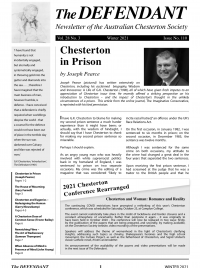Gary Furnell’s article, “Chesterton and the Tragic Mystery of Suicide”, in the Autumn 2021 Defendant sparked wide interest and was reprinted in various online journals. His further reflection is on the changing nature of modern funeral events. What meaning and purpose do they convey? Do they benefit from a structured liturgy and an established pattern of mourning?
Working as a funeral assistant, I attend a lot of funerals.
The settings vary – beach and sports’ clubs, churches, cemeteries, and small chapels. I work with many different celebrants, religious and civil. I meet hundreds of grieving people. Qoheleth in the Old Testament observed three thousand years ago that there’s more to learn in the house of mourning than in the house of feasting, so I’ve tried to gain insight from my experiences, as well as earn a living among the dead and their mourners.
I quickly learned that an increasing number of people prefer to arrange a non-religious funeral with a civil celebrant officiating. The benefit is that family or friends can arrange the event according to their perception of the life and values of the deceased.
But this freedom can have negative consequences too. When there’s no funeral liturgy to guide proceedings, then sentimentality, imprudence and verbosity can dominate proceedings.
Liturgies limit this domination. Liturgies have been developed in response to human needs, strengths and weaknesses over hundreds of years. The words they use are balanced and thought-filled. The rituals they prescribe are meaningful; the gestures of the liturgy have been developed over hundreds of years, and meet—or help meet—deep human needs.
Liturgies, including funeral liturgies, have longevity because they express us better than most of us can express ourselves.
Non-liturgical funerals can have dignity and consolation. Often they are lovely celebrations, but those arranging the funeral must work hard to ensure decorum and good sense prevail over ineloquence and sentimentality. For instance, well-meaning celebrants may wish to provide consolation, but end up in a metaphysical muddle; feel-good notions supplant meditative restraint.

In the absence of carefully defined doctrines we can be offered vague doctrines. It’s quite common for civil celebrants to say, at a funeral, something like: “Bob is now enjoying a beer with the friends and family who’ve gone before him.” What occult gifts have they got to pronounce this? By what authority can they know?
This confusion has grown because our culture broadly has rejected Judeo-Christianity’s supernatural explanation for everything, but no natural explanation for everything has taken its place.
And then we discover that if we’re left to make up our beliefs to suit ourselves, we’ll quickly be in a mess of illogic and emotionalism. Nearly one hundred years ago Chesterton wrote about this sort of confused neo-Paganism:
“Unless all these things are subject to a more centralised and well-balanced conception of the universe, the local god becomes too vivid, we might say too visible, and strikes his worshippers with madness… There is nothing in Paganism to check its own exaggerations; and for that reason the world will probably find again, as it found before, the necessity of a universal moral philosophy supported by an authority that can define.”
“A Century of Emancipation,” The Well and the Shallows, 1935
In the absence of liturgical gestures and formulas, words must substitute for gestures. But words are often a poor substitute for ritual gestures. As Chesterton wrote in one of his Illustrated London News articles:
“There is no need to explain ritual by remote extravagances, because it does not need any explanation. It explains itself. It explains all sorts of other things much better than definitions or abstractions can explain them. To scatter flowers on a grave is simply a way in which an ordinary person can express in gesture things that only a very great poet can express in words.”
“On Funeral Customs and the Brotherhood of Man”, in Collected Works of G.K Chesterton, Vol.34, 1991
Human actions are often more articulate than our words. Liturgists understand our embodiment, and they created rituals to allow us broader expression. In civil funerals, new types of rituals are created to allow us this varied expression. For example, mourners might write brief messages on the casket, or release balloons at the conclusion of a graveside service.
Humanity loves rituals. If we abandon one set of rituals, we immediately invent their replacements. But the new rituals suffer this problem: they haven’t yet been tried, tested, refined and ratified over time by multiple generations. In other words, they aren’t deeply communal rituals, broadly understood and widely enacted.
The new rituals are often left unexplained, but the expressive urge is sensible. As Auden wrote: Only in rites /can we renounce our oddities/ and be truly entired. (Archaeology, 1973)
